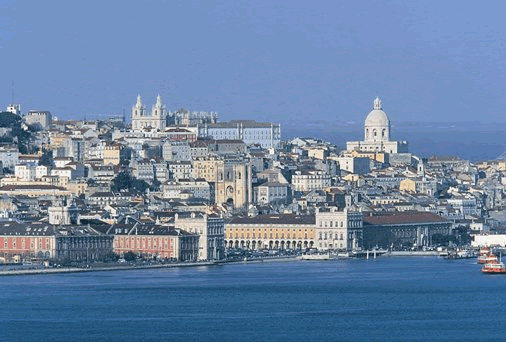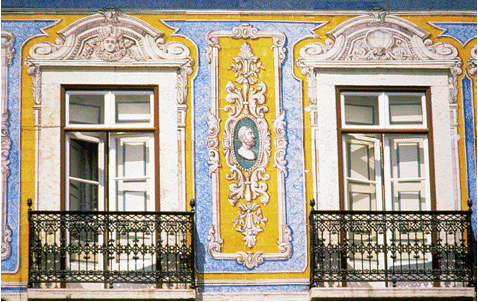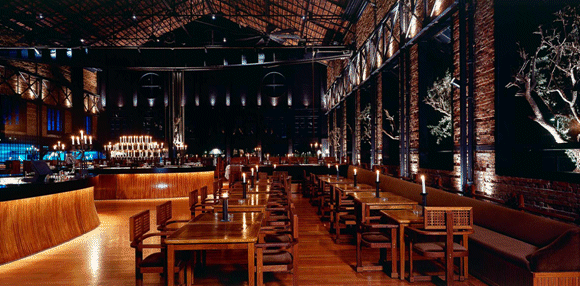LISBOA INVITES YOU!
To know Lisboa is to enter a world of possibilities - yours!
Lisboa always offer something special to its visitors and however many descriptions you have read, you will only know which Lisboa is yours once you have arrived here.
We will lend the climate, colours, gastronomy, history, diverse culture life and the breathtaking landscape in the surroundings to your visit.
Legend has it that Lisboa was founded by Ulysses. The name comes from «Olissipo», which has its origins in the Phoenician words «Allis Ubbo», meaning «enchanting port».
Most likely it was founded by the Phoenicians and styled by the Moores which shows in the strong Arabic influences. It was, after all, ruled by the Moors for 450 years. In the 12th century the Christians re conquered the city but it was not until the mid 13th century that Lisboa became the country's capital.
With the beginning of the Portuguese Age of Discoveries, Lisboa enriched as a spice and jewellery trade centre.
The breakthrough for Portuguese expansion came in 1498 when Vasco da Gama discovered the sea route to India. This was indeed the beginning of a golden age, characterised by the Manueline architectural style named after King Manuel I, with its typical decorative use of maritime motifs. Over the centuries Lisboa naturally grew and changed. When the city centre was almost completely destroyed by the earthquake of 1755, it was rebuilt by Marquise de Pombal , who thus created the Baixa Pombalina, a commercial area that still retains much of its original lay out.
Over the past few years the city has prepared itself for the future.
Lisboa held an enormously successful international EXPO in 1998 and European Football Championship in 2004. As a result, a city that was already vibrant and diverse rapidly acquired a more modern and avant-garde dimension. As The Observer said, «Lisbon itself change, phoenix-like, into a more modern and colourful city».
Lisboa is a historic capital, a potpourri of unusual character and charm, where 800 years of cultural influences mingle with modern trends and life styles creating spectacular contrasts.
Richly captivating, Lisboa Invites You!

DON'T MISS THE OPPORTUNITY TO VISIT
Alfama - charming ancient Moorish quarter with narrow winding streets and picturesque white washed houses, crowned by St. George's Castle.
Bairro Alto - a typical night-resort and the centre of «Fado», the traditional folk song of Portugal.
Baixa (downtown) - the busiest financial and shopping area. Praça do Comércio, the magnificent «Black Horse» Square with its Triumphal Arch facing the River Tagus, the Cathedral, the City Hall, the Carmo Convent, etc.
Belém - the westernmost part of the city, known by its monuments (Tower of Belém, Jerónimos Monastery, Discovery's Monument, Cultural Centre, Royal Coaches Museum, Ajuda Royal Palace, Folk Art Museum, and the Presidential Palace), also for its leisure and recreational areas (marinas, yacht clubs, restaurants, sports stadium, fountains and gardens), and its events (parades, meetings and races).
Remember, it was from Belém river shore that the ships of Vasco da Gama and other famous explorers set sail, near its graceful Tower (1515) and Jerónimos Monastery, two of the finest examples of the Manueline style.
Parque das Nações - the site of the Expo'98, with new spectacular sights of Lisboa: the Vasco da Gama Tower, the old oil refinery Galp Tower, the Pavilhão de Portugal (a new building designed by the rewarded Portuguese architect Siza Vieira), the Oceanarium, and the superb «Atlantico Dome» - Lisboa's multipurpose hall for sports, shows, meetings and exhibitions.
Mini Cruise Tagus River - A mini cruise is a real must in order to enjoy Lisbon, a city overlooking the river and the ocean. Centuries of history will emerge from its monuments scattered along the hills. Panoramic view of «Parque das Nações».
SHOPPING
Shopping in Lisboa is really worthwhile.
In addition to the many international brand boutiques, megastores and designer shops, you will also dins best quality domestic leather articles such as bags, belts and shoes, some of them handmade.
You can also pick-up Portuguese hand-painted tiles and crystal glass articles at most reasonable prices. Fine leather goods, lead crystal ware, porcelain, vintage wines, golden and silver filigree, pottery and specialist textiles are considered excellent buys in Portugal.
The Baixa quarter and Chiado area are where most of the shops are located. Special Antique Shops are generally concentrated in Rua Dom Pedro V, Rua do Alecrim and Rua de São Bento.
The shopping center of Amoreiras, Vasco da Gama and Colombus (the largest shopping centre of the Iberian Pensinsula) and El Corte Inglês offer even more national and international shops.
Shops are open from 09h00 to 13h00 and 15h00 to 19h00 Monday to Friday, and 09h00 to 13h00 on Saturdays. In shopping malls, they stay open during lunch hours, and close later at night, including weekend.

DINNING & ENTERTAINMENT
Dinning
There are a wide variety of restaurants and cafés in Lisboa ranging from the very elegant and sophisticated to the casual and inexpensive.
Restaurants, bars, some with live music/shows, and discos along the river Tagus, the Docas area and at the Nations Park, are very popular, especially during weekends.
Entertainment
Lisboa has a variety of theatres and venues catering for most tastes.
Opera, ballet, concerts, etc. take place on a regular basis all year round.
Portuguese Fado and Folklore shows are popular, and an international show at Casino Estoril (the largest in Europe), with glittering cabaret complements the many discos and other night spots.
Excellent golf courses, water sports and horse riding tempt the energetic delegates. The more relaxed might choose from many noteworthy museums and monuments, sunny beaches and interesting sites to explore.
